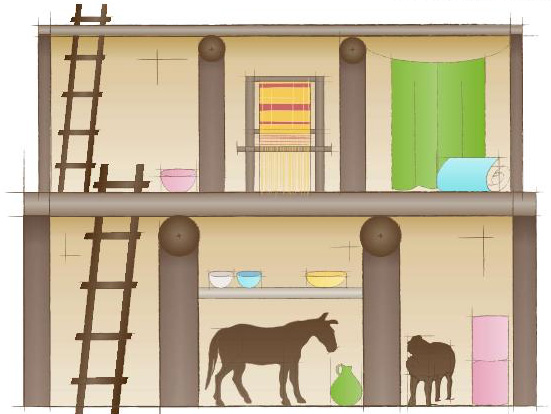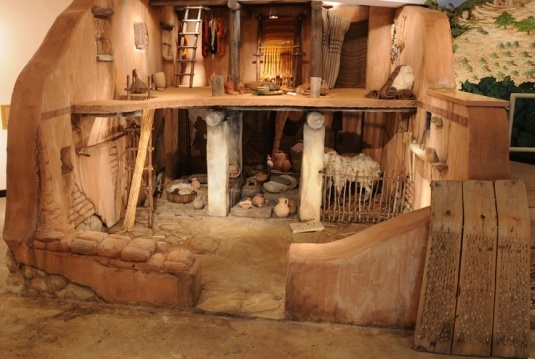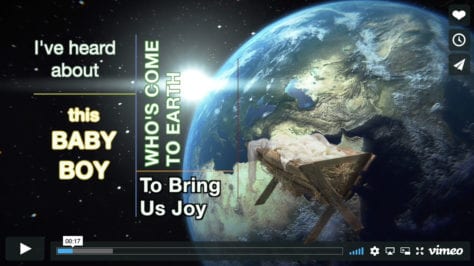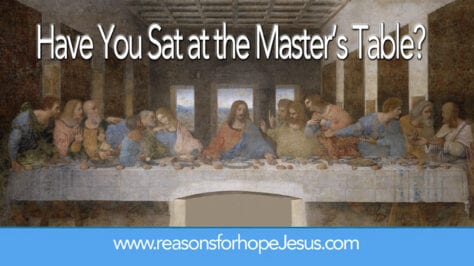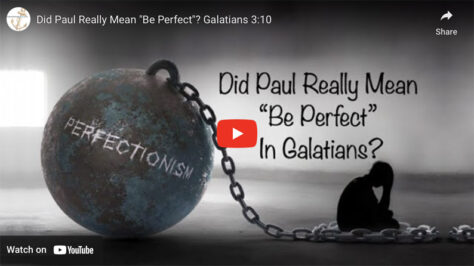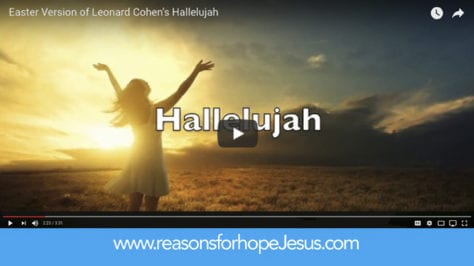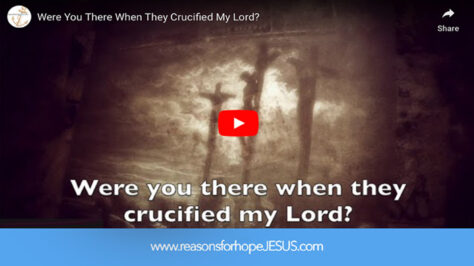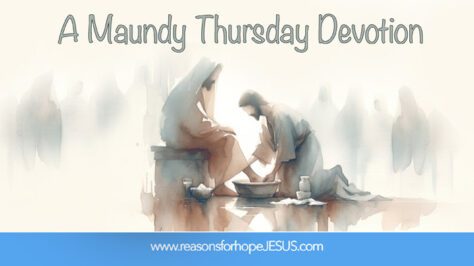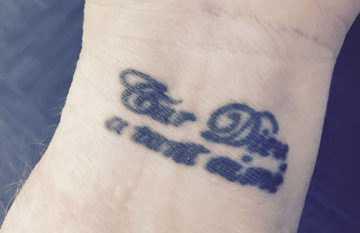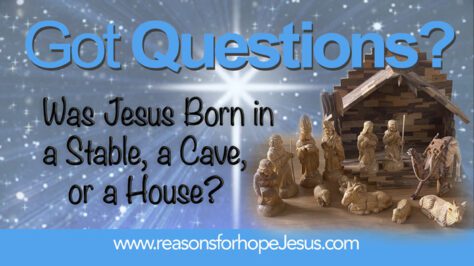
Many have Nativity scenes that feature a stable as Jesus’ birthplace, but was Jesus born in a stable? Or could it have been a cave? Or a house? The easy answer to this is that we don’t know. We can’t be sure because the Bible does not explicitly tell us. However, we can reason. Using the Bible, we can consider where Jesus was most likely born.
Tradition says that Jesus was born in a stable.

Based on Luke’s account, after Jesus was born, He was laid in a manger. Because of that, most nativity scenes, narratives, plays, etc, tell of a stable as His birthplace.
Luke 2:7, 12 And she brought forth her firstborn son, and wrapped him in swaddling clothes, and laid him in a manger…and this shall be a sign unto you; Ye shall find the babe wrapped in swaddling clothes, lying in a manger.
The Greek word for manger is phatne, and The Strong’s Dictionary defines it as: from pateomai (to eat); a crib (for fodder):–manger, stall.
A manger (phatne) was a type of feed trough for animals. So, nativity scenes with baby Jesus in a straw-laden feeding trough are biblically accurate. And since Jesus was “laid in a manger” (Luke 2:7), animals were likely nearby, as nativity scenes always depict. However, the Bible does not tell us that. Nor does it say His birth occurred in a stable.
A Stable or a Cave?
Historical records suggest that animals were also kept in caves during the first century. Therefore, some suppose that Jesus was born in a cave. Again, the Bible does not tell what type of building sheltered Mary, Joseph, and Jesus when He was born. It only records that Jesus was laid in a manger, a phatne, a crib for fodder, or a stall.
A House?
Another credible and insightful theory, but not as widely circulated or accepted, is that Jesus was born in the lower level of a house. The Bible tells that Joseph took his betrothed wife, Mary, and traveled to Bethlehem, the city of their father David, to comply with the census that was required by Caesar Augustus (Luke 2:1). This would have been quite a hardship for Mary physically because of her pregnancy and for Joseph financially because they had little money. So, it’s reasonable to think that Joseph and Mary would have sought lodging with a relative in Bethlehem.
It’s also reasonable to consider that their travel to Bethlehem was slow because of Mary’s near full-term pregnancy condition. Perhaps when they arrived at a relative’s home, it had already been filled with other relatives who were also there to comply with the census. Therefore, there was no room for them in the house.
Let’s review the biblical narrative in considering the three possible birthplaces- a stable, a cave, or an inn.
No Room in the Inn?
Luke 2:7 And she brought forth her firstborn son, and wrapped him in swaddling clothes, and laid him in a manger; because there was no room for them in the inn.
It’s long been assumed that the English word “inn” used in Luke 2:7 refers to paid lodging, but could it refer to a relative’s home? The English word “inn” is a translation from the Greek word “kataluma.” Strong’s Dictionary defines Kataluma as:
from G2647; prop. a dissolution (breaking up of a journey, i.e. (by impl.) a lodging-place:–guestchamber, inn. From 2647. Kataluo: to loosen down (disintegrate), i.e. (by impl.) to demolish (lit. or fig.); spec. [comp. G2646] to halt for the night:–destroy, dissolve, be guest, lodge, come to nought, overthrow, throw down.
Strong says that a kataluma is a place of rest, lodging, or guest quarters. It does not speak of lodging in a public place or of paid accommodations. We should also note that the Bible does not mention Mary and Joseph being turned away by an innkeeper. The innkeeper has been added to the nativity narrative in books and plays. We can agree it’s by theatrical license — it’s adding to the biblical text.
The Guest Chamber?
The word kataluma is also used in Mark and Luke, but is translated using a different word:
Mark 14:14 And wheresoever he shall go in, say ye to the goodman of the house, The Master saith, Where is the guestchamber [kataluma], where I shall eat the passover with my disciples?
Luke 22:11 And ye shall say unto the goodman of the house, The Master saith unto thee, Where is the guestchamber, where I shall eat the passover with my disciples?
In both Mark and Luke, “kataluma” is translated as “guest chamber,” not “inn.” And in the next verse in Luike, “kataluma’ is further defined as the upper room in a house.
Luke 22:12 And he shall show you a large upper room furnished: there make ready
These verses tell of the upper room where Jesus ate His last supper with His disciples on the night He was betrayed. The room was not rented. It was an upper room, a guest chamber (kataluma) in a friend’s house. It was not an “inn,” as we would think of paid lodging or accommodations.
Historical records and archeological findings confirm that first-century Jewish homes were constructed with an upper room guest chamber and a lower level for sheltering animals, especially during the cold weather.
When an Inn is an Inn
There is a Greek word for “inn” that conveys the meaning of paid lodging. It is “pandocheion.” Although not used in the nativity narrative, it is used in the parable of the Good Samaritan and is correctly translated as “inn.”
Luke 10:34 And [the Samaritan] went to him, and bound up his wounds, pouring in oil and wine, and set him on his own beast, and brought him to an inn, and took care of him.
Luke 10:35 And on the morrow when he departed, he took out two pence and gave them to the host [innkeeper], and said unto him, Take care of him and whatsoever thou spendest more, when I come again, I will repay thee.
The Greek word pandocheion is defined by Strong’s dictionary as “a public lodging-place–inn.” And the Greek word translated “host” in Luke 10:35 is “pandocheus” — defined by Strong’s as “an innkeeper (warden of a caravanserai)–host.”
There is no doubt the place of lodging in Luke 10 was a place of paid accommodations, and the host was an innkeeper who was paid for his services.
Since the word pandocheion was not used in the nativity narrative, we must consider that Mary and Joseph were turned away from a kataluma, an upper room guest chamber in a house, and most likely a relative’s home. Now, let’s consider where Jesus was born.
Upper Room vs Lower Level
A two-story home’s eating and sleeping quarters would have been on the upper floor during biblical times. The lower level was often used as a shelter for livestock during inclement weather. Mary and Joseph were turned away because there was no room in the guest chamber (the upper room), but they could have sheltered in the lower level among the animals. This would explain their access to a manger in which Jesus was laid.
This does raise the question of why a relative would have turned away a pregnant woman, even if the upper room was filled. A possible explanation is that Mary’s pregnancy would have been considered shameful. Mary was pregnant during her betrothal to Joseph. They were not yet married. That would have been a sin of great disgrace, and since betrothal was legally binding, Joseph even had the right to put Mary to death (Matthew 1:18-19) for having committed adultery. Of course, he did not because he loved her.
Only after Jospeh’s decision to “put [Mary] away privately” (Mat 1:19) did an angel appear to him and tell him about the conception of Jesus. This shows what great love Joseph had for Mary. Yet, Mary’s pregnancy would have been viewed as shameful by the family. They did not know what was revealed to Mary and Joseph and would have thought Mary was pregnant with the illegitimate child of Joseph or another. They had no way of knowing Mary was pregnant with the legitimate Son of God, and so they turned her away, and the couple found shelter with the animals in the lower level.
Rejected by His Own
Perhaps we should consider this to have been the first rejection of Jesus. When Mary and Joseph were turned away, so also was Jesus turned away. Even before His birth, He was rejected by His own:
John 1:11 He came unto his own, and his own received him not.
Still Only A Theory
This theory about Jesus being born in the lower level of a house is reasonably possible and very probable. But remember, it’s still only a theory. The Bible only tells that they were turned away from lodging in a guest chamber and that Jesus was laid in a manger.
40+ Days Later
We know that “when the days of [Mary’s] purification according to the law of Moses were accomplished, they brought [Jesus] to Jerusalem [about 10 miles from Bethlehem], to present him to the Lord [at the Temple] (Luke 2:22). Thirty-three days were required for Mary’s purification (Leviticus 12). So it would have been 40+ days after Jeus’ birth that they went to the Temple in Jerusalem.
The Bible does not tell us where they stayed during those 40+ days. Perhaps, with the departure of the upper room guests, the homeowner (a relative?) may have had compassion and invited Mary, Joseph, and Jesus to move from the lower level to the upper room.
Conclusion
I cannot stress enough that this theory is only reasoning from God’s Word. The Bible doesn’t tell us what kind of shelter Jesus was born in. However, it’s interesting to think that at the beginning of Jesus’ life, He was rejected and turned away from an upper room, and only a faithful few came to see the newborn Christ Child. Similarly, Jesus gathered in an upper room with His 12 disciples at the end of His life. One rejected him and left (Judas), but a faithful few (11) remained in that upper room.
This theory of Jesus’ birth in the lower level of a house answers many questions. But we must remember where Jesus was born is not what’s important. What is important is that God sent His son to earth to be conceived in the womb of a young virgin. He took on human form, was born in humble surroundings, lived a sinless human life, presented Himself as the perfect Lamb of God, and finished the work His Father had sent Him to do—dying to pay for the sins of the world. Jesus was born to die!
Remember, the sacrifice of the cross began in the cradle. Without the Christmas cradle, we would not have the Calvary cross!
For unto us a Child is born, unto us a Son is given. (Isaiah 9:6)
Jesus IS the reason for the season!
For God so loved the world, that he gave his only begotten Son, that whosoever believes in him should not perish, but have everlasting life. For God sent not his Son into the world to condemn the world; but that the world through him might be saved. (John 3:16-17)
<*}}}><
The Season of Advent (the 4 weeks before Christmas)
What is Advent?
HOPE Advent Candle 1 – Prophecy Gives Hope (video)
LOVE Advent Candle 2 – Promise Reveals Love (video)
JOY Advent Candle 3 – Jesus Is Our Joy (video)
PEACE Advent Candle 4 – Pause to Find Peace (video)
Christmas Day: When Love Was Born — Light the CHRIST Candle (video)
What is the Prophetic Symbolism of Advent Candles?
How Do We “Take” Advent and Find Rest?
Download a Daily Devotional for Advent
Download “King of Love” Daily Advent Devotions
A Christmas Poem to Download and Print
Christmas-themed GOT QUESTIONS?
- What are the Events of Jesus’ Birth? A Simple Timeline and Chronology
- Misconceptions about the Journey to Bethlehem (video)
- What do Zelophehad’s Daughters have to do with Christmas?
- Errors in the Nativity Story? Is Jesus’ birthplace wrong?
- Who were the Three Wise Men? Fact or legend?
- How Did the Wise Men Know to Follow His Star?
- Did The Wise Men Arrive 12 Days After Jesus’ Birth? Or Was It Much Later?
- What is the significance of the Three Kings' gifts?
- Was Jesus born in a stable, a cave, or a house?
- Should we celebrate Jesus’ birthday in September?
- Was Jesus born in September (not December?)
- Does “Xmas” Cross Jesus Out of Christmas?
- What is the Prophetic Symbolism of Advent Candles?
- The Most Important Lesson for YOU in the Nativity Story?
- Was Mary a Levite, making Jesus both King and Priest?
- Should Christians Celebrate Christmas?
- How did Jesus become a man?
- Do You Get These 7 Things Right or Wrong About the Nativity Story?
- Are You Stuck in the Middle This Christmas? (short video lessons from the popular comedy TV show "The Middle.")
- What are the Prophecies of Christmas? (video)
- Where are the genealogies of Jesus in Mark and John?
- Why Are There Two Different Genealogies for Jesus?
- Should I Say “Happy Holidays” Instead of “Merry Christmas?
- “Immanuel” — A Poem by Charles Spurgeon (1834-1892)
- Who’s Often Forgotten in the Birth of Jesus Story?
- Why is Simeon Significant in the Nativity Narrative?
- Why is Anna Significant in the Nativity Narrative?
Christmas-themed Articles
- Scripture Cookies – Fun for the Whole Family!
- A Boastful Christmas Letter
- Peace Delivers Hope
- Promise Ignites Hope
- Preparation Produces Hope
- Prophesy Reveals Hope
- Alone at Christmas? Feeling lonely?
- Another reason God came to dwell with man.
- How can you have a white Christmas without snow?
- Christmas, abortion, and Joseph, the forgotten man of Christmas
- Remember the Wonder of Christmas
- Will you find rest, peace, and joy this advent season?
- A Christmas Morning Prayer by Robert Louis Stevenson (1850-1894)
- The Christmas Story in Poetic Verse, by Alvy E. Ford (1918-2005)
- Need a Quick Christmas Letter with a Significant Message?
- It All Happened in a Moment
- T’was the Night Before Jesus Came
Christmas Word Search Puzzles
Scripture from: Isaiah, Matthew, Luke, and John. A Christmas message from “In the Bleak Midwinter”
Christmas-themed Videos
- The Most Beautiful O Holy Night O Night Divine, when Christ was Born
- A Baby Changes Everything, by Faith Hill
- Mary, Did You Know?
- While You Were Sleeping — A Wake Up Call for America
- I Heard the Bells on Christmas Day, by Henry Wadsworth Longfellow, performed by Casting Crowns
- Mary’s Child — from the movie, A Christmas Wish
- The True Meaning of Christmas: The Sacrifice Began (How Many Kings)
- What If You Had Been There When Jesus Was Born? (video)
- Pause to Find Hope. Receive the Promises of God. See Jesus. Hear God’s Plan.
- Christmas Trivia Fun
- Songs of Christmas Series: Away in a Manger; Mary, Did You Know? The Rose of Bethlehem; Good Christian Men Rejoice; Hark! The Herald Angels Sing; I Wonder As I Wander; What Child Is This? The First Noel; In the Bleak Midwinter (a golden oldie)
Have You Heard About This Baby Boy? A most beautiful rendition of Leonard Cohen's Hallelujah, with a Christmas message to touch your heart and give joy to your soul.
*******
Jesus is the Reason this Ministry Exists
At Reasons for Hope* Jesus, we are committed to equipping, encouraging, and empowering Christians to know Jesus better, love Him more, and share their faith. We also reach the lost through our Salvation Page.
With your support, we can continue to provide valuable resources and engaging content. Please join us in our mission by donating today. Your generous contribution helps us expand our outreach of sharing biblical truths and hope in Jesus. Thank you for your kindness and for being an integral part of our mission.
*******
*******
***A Hidden Message in Psalm 23?***
Hidden in the six verses of Psalm 23 are 11 names for Jesus. When you subscribe to our newsletter, we’ll send you The Names of God in Psalm 23 PDF that reveals all 11 names and Scripture verses of comfort and hope (link will be sent in your confirmation email).
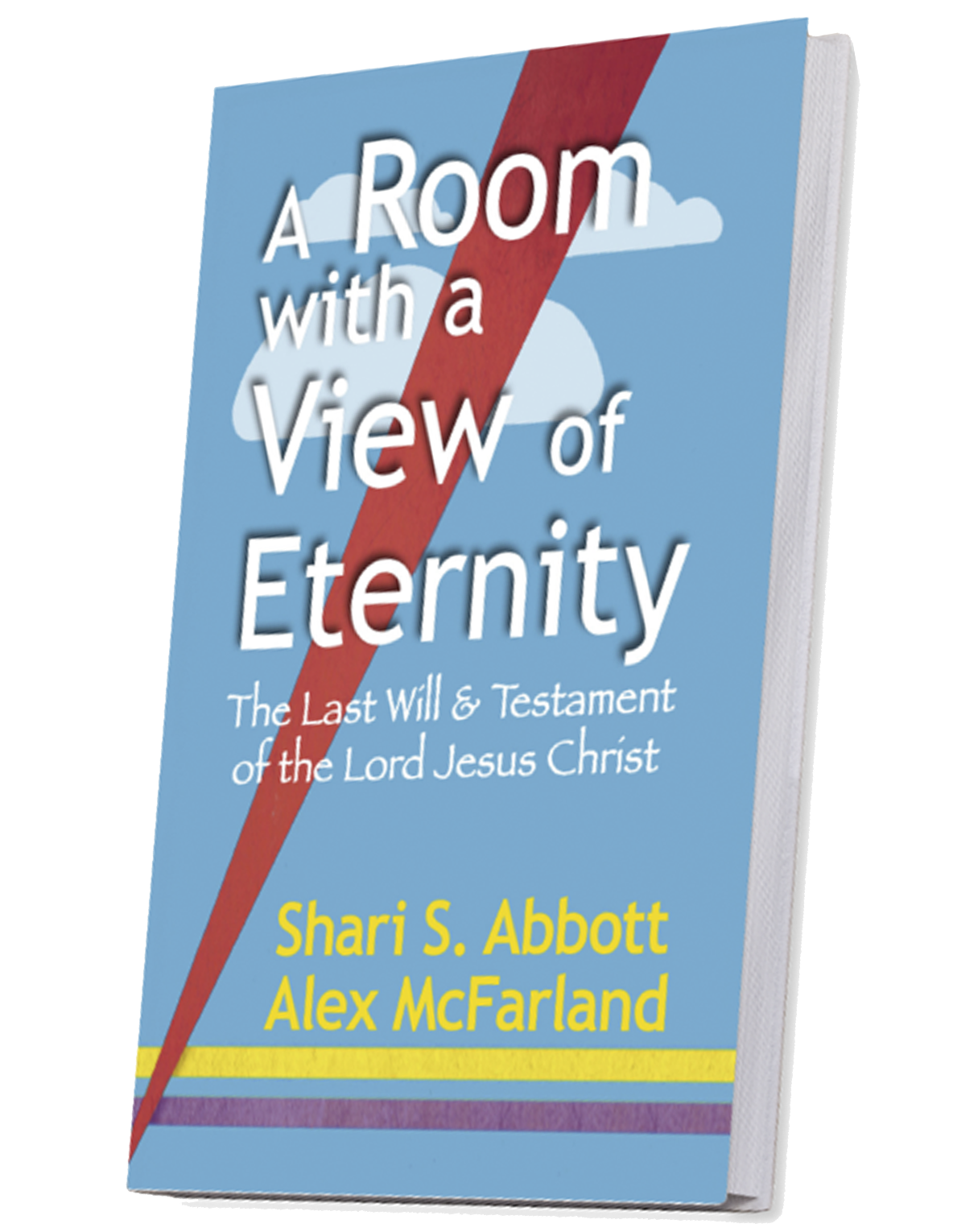 A Room with a View of Eternity—The Last Will & Testament of Jesus Christ Take a seat at the Master's table. Learn about the riches He gives to all who are His. This book will bless and encourage you, give you hope, and help you live in the joy of your salvation and the riches of Christ that are yours.
A Room with a View of Eternity—The Last Will & Testament of Jesus Christ Take a seat at the Master's table. Learn about the riches He gives to all who are His. This book will bless and encourage you, give you hope, and help you live in the joy of your salvation and the riches of Christ that are yours.

The Top Ten Got Questions? in 2023
- The Meaning of NUMBERS in the Bible?
- Was Jesus CRUCIFIED on Wednesday, Thursday, or Friday?
- How was Jesus Like a Worm? What’s the CRIMSON (OR SCARLET) WORM in Psalm 22?
- How are the Shepherd’s ROD and STAFF Different?
- How long did JOB SUFFER?
- What is the Significance of the Wise Men's THREE GIFTS? And were they kings?
- Did The Wise Men Arrive 12 DAYS AFTER JESUS’ BIRTH? Or Was It Much Later?
- Jesus’ Last Days TIMELINE: the Cross and the Resurrection
- The Meaning of COLORS in the Bible?
- Did Jesus Fight Satan to Take Back the KEYS of Death and Hell?
There is much to be learned from those who have gone before us in the faith. Check out our Cloud of Witnesses category that features the words of departed saints who are now with the Lord in glory. Their words equip and encourage us even to this day. Take a few minutes to hear...
- ONLY ONE LIFE, Twill Soon Be Past – by C.T. Studd (1860 – 1931)
- “The Love of God is Greater Far” by Frederick M. Lehman (1917)
- Prayers from Billy Graham
- Who Was Robert Robinson? What’s the Story Behind “Come Thou Fount”
- “Immanuel” — A Poem by Charles Spurgeon (1834-1892)
- Who Am I? A Poem by Deitrich Bonhoeffer (1905-1945)
- Understanding the Everlasting Arms of God, by J.R. Miller (1840–1912)
- 24 Reasons Why I Love America, by John Wayne (1907-1979)
- Give Me Perpetual Broken-heartedness (from The Valley of Vision)
- Abide with Me, by James Smith, 1859
This remains one of our most popular pages viewed.![]()

TOP TEN Videos from Reasons for Hope* Jesus
- Memorial Day BAGPIPES TRIBUTE: Amazing Grace
- RISE AND SHINE and Give God the Glory, Glory!
- WERE YOU THERE When They Crucified My Lord?
- PAUL HARVEY: THE BIRDCAGE
- PRESIDENT RONALD REAGAN: A SOLDIER'S PLEDGE
- Hark! the Herald Angels Sing -- CHARLIE BROWN Christmas
- JOHN WAYNE ~ WHY I LOVE AMERICA
- Jimmy Stewart - Nativity Scene Prayer: Mr. Krueger's Christmas
- THE LEGEND OF THE CANDY CANE - A Christmas Story to Share
- Not by Might, Not by Power, But BY MY SPIRIT says the Lord (Zechariah 4:6)
*****************

